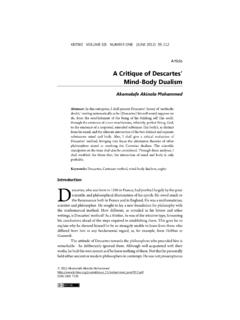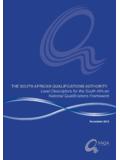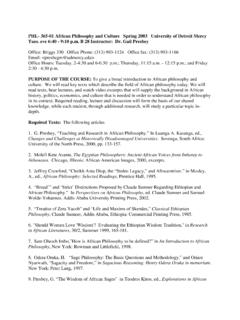Transcription of The Crisis of Identity in Africa: A Call for Subjectivity
1 KRITIKE VOLUME FOUR NUMBER ONE (JUNE 2010) 108-122 2010 Thomas Kochalumchuvattil ISSN 1908-7330 Article The Crisis of Identity in africa : A Call for Subjectivity Thomas Kochalumchuvattil Introduction he humanitarian problems of africa are manifest and widespread. Periodic occurrences of ethnic cleansing as seen in Rwanda, the ongoing conflict in Darfur-Sudan, the breakdown of democracy under the dictatorship of President Robert Mugabe in Zimbabwe, the outbreak of post-election violence in Kenya, the widespread growth of HIV/AIDS and overwhelming endemic poverty are by no means isolated examples of the tragedies which continue to plague the continent. These and similar issues have become the subject of intense philosophical debate and reflection.
2 This contribution to the debate will argue that if a sustainable solution to all of these problems is to be found the key area requiring philosophical debate is the degree to which the subjective development of the self is submerged in an african sense of collective Identity . The first section of this article points to the african Crisis in Identity and considers the role of the Ubuntu philosophy in the recovery of the african Identity and self respect while at the same time arguing that it is insufficient in itself to consistently bring about the growth of freedom and responsibility that are the marks of true personhood. It is argued that this lack of individuation is at the root of the african Crisis in Identity and in the failure of the continent to sufficiently address its problems.
3 The prevalence of communalism in african society is identified as the main barrier to the process of subjective becoming. This argument is developed in the second section where communalism is presented as being rooted in the african s cosmic vision. In the third section, one finds that the lack of recognition of self-hood is attributed to the excessive objectification or over-determination of the cultural community. The fourth section briefly introduces Kierkegaard s call for Subjectivity as a guiding framework to overcome oppressive communalism in the african situation. This argument is further developed in the fifth section where it shown that Kierkegaard s call for Subjectivity is essential for the emergence of the personhood necessary to make the intersubjectivity at the heart of african Philosophy in general, and Ubuntu in particular, an authentic reality.
4 The sixth section finally makes use of the five african principles of Nguzo Tano in order to map out the path of Subjectivity in the african context. T T. KOCHALUMCHUVATTIL 109 The Question of Self- Identity and the Philosophy of Ubuntu The search for Identity has always been a key issue facing mankind in its striving after significance and meaning. However the african understanding of self is in Crisis having been assailed from a number of directions. The female Kenyan 2004 Nobel Peace Laureate, environmental activist and writer Wangari Maathai opines that if africa is to build for the future it must first face its past. The book shows africa s colonial history as a disastrous period for the continent and how many of the problems faced by its people today stem from that past. It tells of africa s loss of Identity under its colonial occupiers and the disintegration of societal hierarchies that had developed over centuries.
5 The resulting Crisis of leadership, corruption and a reluctance to relinquish power has stunted development. Puppet governments, the exploitation of the continent s abundant natural resources and the use of african nations as a buffer against eastern communism or western capitalism have, for Maathai, left africa both physically and psychologically The Historical Overview of the Berlin Congo Conference in 1884-85 and its consequences found in Part 1 of the Report on the Reconciliation Conference africa Europe which took place in Ambilly, France 29-31 October 2002 took a similar view of the consequences of colonialism. The report concluded that aside from, a loss of Identity , and distrust in african national and regional and tribal identities, along with economic impoverishment there exists a, lack of love in africa along with wars, genocide, ethnic conflicts.
6 The report goes on to say that, Africans tend to remain in a victim role, which is easier than taking responsibility for their own sins and hatred. 2 Historically, africa may have lagged behind Europe in terms of technology. However, long before the coming of Europeans to the continent Africans possessed social and political philosophies as valid as those of their European counterparts. These systems revolved around a universal recognition of human worth which formed the spiritual foundation of african societies. The name given to the underlying philosophy is Ubuntu (a Zulu word). It is a unifying vision or worldview inspired by the Zulu maxim, umuntu ngumuntu ngabantu (a person is a person through other persons).3 The philosophy of Ubuntu (humanness) in recent times has gained significant attention in african philosophical discourse especially due to the political developments in South africa and the call made by President Thabo Mbeki for 1 Wangari Maathai, The Challenge for africa : A New Vision (London: William Heinemann, 2009), 4-5.
7 2 Part 1 of the Report on the Reconciliation Conference africa -Europe, Ambilly, France 29-31 October 2002, < >, 29 September 2009. 3 Augustine Shutte, Philosophy for africa (Rondebosch, South africa : UCT Press, 1993), 46. 110 THE Crisis OF Identity IN africa an african Renaissance. 4 The search for an african philosophical explanation of the experience gained under the Truth and Reconciliation Commission (TRC) has also accelerated intellectual interest in this emerging philosophy. According to Ubuntu, there exists a common bond between all human beings and it is through this bond and through our interaction with our fellow human beings that we discover our own human qualities. The South african Nobel Laureate Archbishop Desmond Tutu describes Ubuntu in this way: Africans have this thing called UBUNTU.
8 The essence of being human. It is part of the gift that Africans will give the world. It embraces hospitality, caring about others, willing to go the extra mile for the sake of others. We believe a person is person through another person that my humanity is caught up, bound up and inextricable in yours. When I dehumanize you I inexorably dehumanize myself. The solitary individual is a contradiction in terms and, therefore, you seek to work for the common good because your humanity comes into its own community, in In many ways Ubuntu philosophy finds a unique position between the objective and subjective approaches to Identity . This is very well expressed by Dion Foster: .. if one were to apply the dialogical conceptual framework of I - Thou developed by Martin Buber in his philosophical essay Ich un Du (1923), one would be able to show that in the african worldview it is neither the I (individual) nor the Thou (community) that takes ontological primacy.
9 Rather the ontological primacy is focussed on the hyphen, the between , of the I 4 However, it is to be pointed out here as Tejada has argued that Ubuntu philosophy is practiced by Africans in most parts of the continent, especially in those regions stretching from the Nubian desert to the Cape of Good Hope and from Senegal to Zanzibar. But Ramose is of the view that this geographical delimitation is problematic since it creates a barrier of the desert to be an africa s birthmark and therefore obscuring the meaning and import of human interaction on the continent before the desert crept in. In order to fully understand the essence and significance of the philosophy, one has therefore to approach the subject historically and comprehensively. See, Mogobe B.
10 Ramose, african Philosophy Through Ubuntu (Harare: Mond Books, 1999), 50. Cheick Anta Diop has traced the generic term for man or ntu, to be the same on other african languages with similar term nit in Wolf, nti in Egyptian, and neddo in Peul. He argues that the designation of a people by a generic term meaning man has been general throughout Black africa , starting with Egypt. See, Cheick Anta Diop, The african Origin of Civilization (Chicago: Lawrence Hill Books, 1974), 198. 5 Desmond Tutu, No Future without Forgiveness: A Personal Overview of South africa s Truth and Reconciliation Commission (London: Doubleday Publishers, 1999), 22. 6 Dion Forster, The impact of knowledge systems on human development in africa (Pretoria: University of South africa , 2007), 261. T. KOCHALUMCHUVATTIL 111 Expressed in another way, Ubuntu philosophy is neither objective nor subjective.










